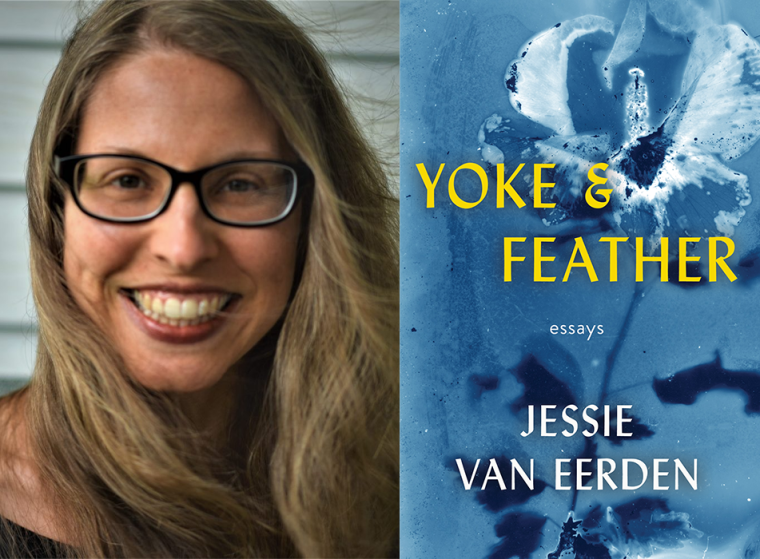This week’s installment of Ten Questions features Jessie van Eerden, whose essay collection Yoke and Feather is out now from Dzanc Books. Yoke and Feather is a collection of braided essays that invites the reader to consider the everyday sacred: blessings for the demolition derby and the public-school lice check, a canoe trip through Boquillas Canyon along the Rio Grande river, and a visit to the kitchen of the biblical sisters, Mary and Martha, as they welcome their improbable foster daughter. Rooted in a rural mountain childhood and threaded with Renaissance painting, Egyptian hieroglyphics, and midlife longing for a partner and child, these essays—both playful and poignant—reimagine familiar scriptural narratives and trace the connections between ancient myth and contemporary life. Booklist says, “Van Eerden’s essays blend an embodied and an ethereal experience of life.... Often the reader gets a sense of being invited into a trance, as if the author’s focus is really a smoky haze. So loaded with imagery, her sentences oblige readers to slow down and savor the words themselves. A strange, wonderful journey.” Jessie van Eerden holds a BA in English from West Virginia University and an MFA in nonfiction writing from the University of Iowa. She is the author of the novels Call It Horses (Dzanc Books, 2021), My Radio Radio (Vandalia Press, 2016), and Glorybound (WordFarm, 2012), and a collection of portrait essays, The Long Weeping (Orison Books, 2017), which won the twentieth annual Foreword INDIES Book of the Year Award in the essay category. She has taught for over twenty years in college classrooms and adult literacy programs, and she directed the low-residency MFA writing program of West Virginia Wesleyan College for seven years. She lives in Roanoke, Virginia, where she is an associate professor of creative writing at Hollins University.

Jessie van Eerden, author of Yoke and Feather. (Credit: Richard Schmitt)
1. How long did it take you to write Yoke and Feather?
About six years in between other projects and life transitions.
2. What was the most challenging thing about writing the book?
Along with many essayists, I found the creation of cohesion challenging; essays are disparate things, yet the book needs to make a whole. I’m not a memoirist, so a contiguous narrative was not the throughline I was drawn to. Instead, I sought out images, themes, and questions to unite the essays.
3. Where, when, and how often do you write?
At my desk at home mostly (or on riverbanks while camping), in the mornings, almost daily in January and in the thick of summer; more like weekly when I’m teaching full-time.
4. What are you reading right now?
The River Below (Welcome Rain Publishers, 2000) by François Cheng and The Shattering of Loneliness: On Christian Remembrance (Bloomsbury, 2018) by Erik Varden.
5. Which author, in your opinion, deserves wider recognition?
Ann Pancake.
6. Would you recommend writers pursue an MFA?
Yes! I recommend an MFA because it gives you time and space to read and write deeply, a solid writing peer or two, and a solid mentor or two. I don’t recommend it if a writer expects a program to land them a book deal. MFAs are, first, foundation-builders and, second, door-openers.
7. What is one thing that your agent or editor told you during the process of publishing this book that stuck with you?
My editor told me, “It’s not just a religious book.” Even though it treats themes anchored in spirituality; it has wider appeal. That encouraged me.
8. If you could go back in time and talk to the earlier you, before you started Yoke and Feather, what would you say?
Enjoy the upcoming onset of quick morning drafting of litanies and prayers and scraps that will become these essays because once the book is all one piece, you will miss that particular sound and the particular set of images that you’ll find generative in this project.
9. Outside of writing, what other forms of work were essential to the creation of Yoke and Feather?
Learning to canoe as a bow paddler, loving and helping to raise my partner’s kids, studying midrash, praying, not being able to pray, scads of reading, listening deeply to the murmur beneath biblical myths, and trying out online dating!
10. What’s the best piece of writing advice you’ve ever heard?
“When the season is fitting, a book will come.” A line of advice from the wonderful poet Diane Gilliam that inspired one of the essays in the collection.







